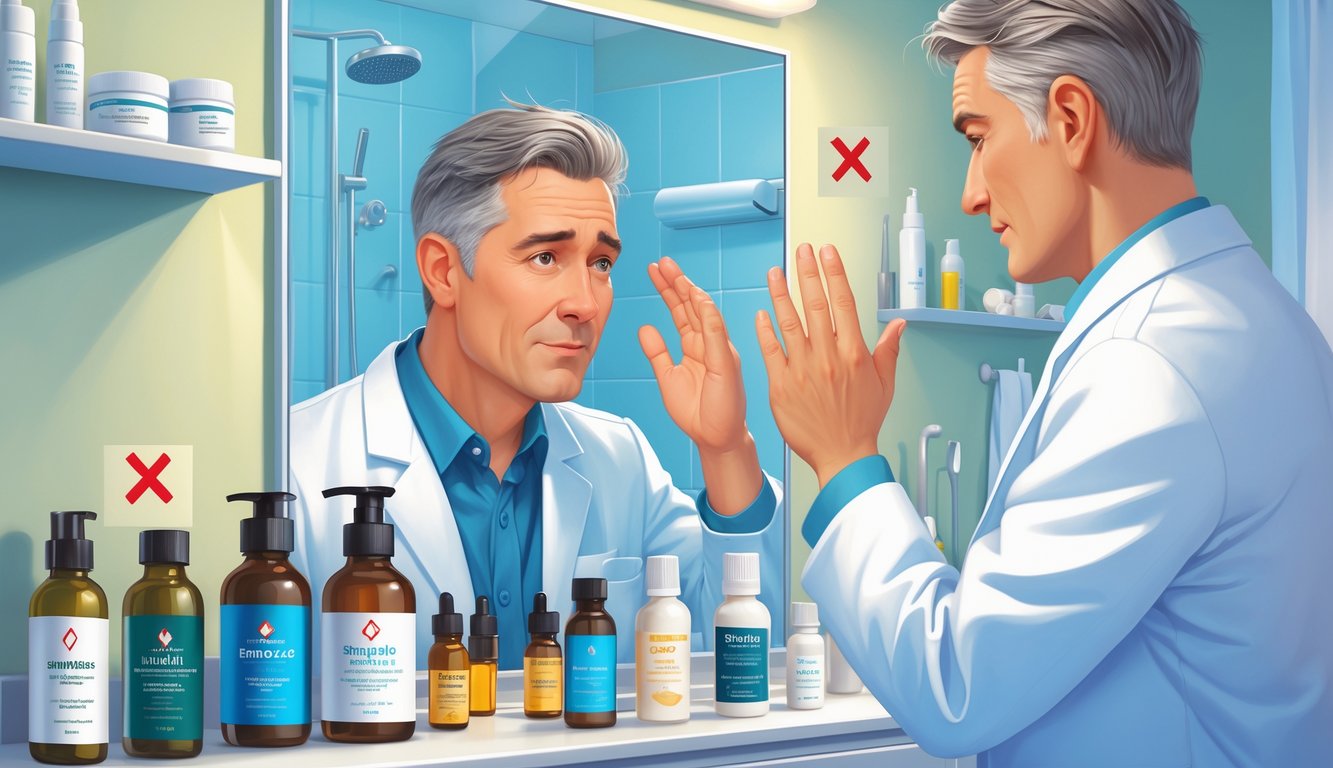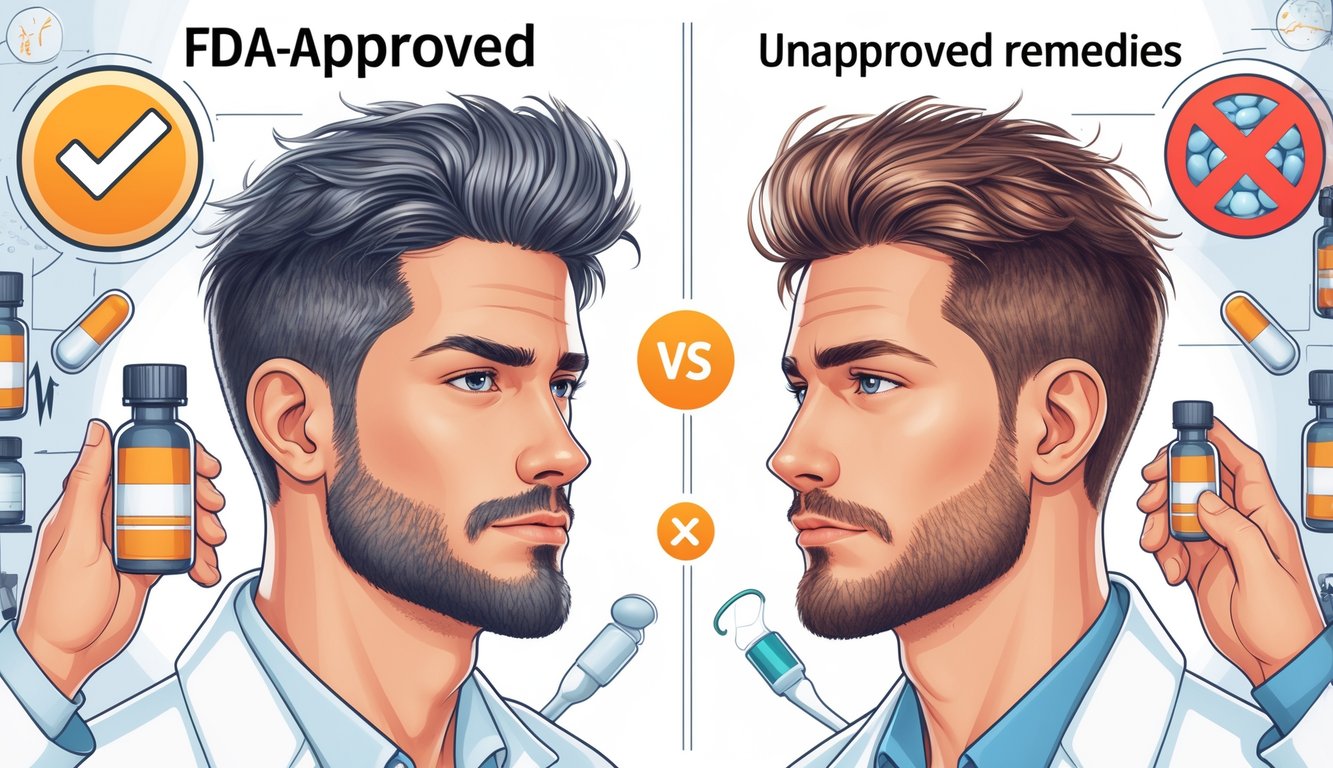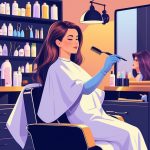
Risks of Unsanctioned Hair Loss Treatments
There’s always that guy—swears mystery liquid from some sketchy website “cured” his bald spot. His scalp looked like someone poured lighter fluid on it. I keep seeing it: people want shortcuts, skip FDA review, and just hope for the best. You won’t know if you’re frying your skin or messing with your hormones until it’s too late.
Scalp and Skin Complications
Ever had your scalp peel or burn? I’ve seen people slather on compounded finasteride from who-knows-where, then act surprised when their head turns into a science experiment. These formulas are all over the place—one bottle’s loaded, another’s basically water. Quality control? Please.
People show up for hair loss, and by the time I see them, it’s infections, inflamed follicles, even chemical burns. Worth it? Not for an itchy, scarred scalp. FDA warnings are everywhere—telehealth platforms sent out stuff that left men with rashes for weeks. It’s rarely just “a little irritation.” Usually it’s steroids, antibiotics, and a scar to remember it by.
And DHT blockers—when you don’t get them from someone who knows your history, weird stuff happens. Dandruff, bleeding, even permanent sensitivity. There’s always some genius online bragging about his homemade minoxidil blend—then DMing me two weeks later with photos of blisters.
Hormonal Side Effects
Back in residency, we joked that DIY hormone blockers were more unpredictable than the hospital cafeteria. It’s not just your scalp—finasteride (especially the sketchy, compounded stuff) can totally mess up your hormones. It drops dihydrotestosterone (DHT), which, yes, causes baldness, but also keeps your libido, mood, and muscle in check. Mess with that, and who knows what happens?
Sexual side effects? Not a myth. Studies show real, sometimes lasting, issues—libido gone, erectile dysfunction, even breast tenderness. Sometimes the problems stick around months after you quit. One guy told me, “Nobody warned me I’d feel this bad.” FDA’s not thrilled—telehealth finasteride left some men with symptoms long after they stopped.
If you’re rolling the dice with imports or “custom” blends, dosing is anyone’s guess. Numbness, depression, random fatigue. Trying to fix your hair and ending up with something worse—hard pass.
Why FDA-Approved Options Are the Gold Standard

Counting out half-used bottles in my bathroom cabinet again—why do I keep coming back to minoxidil? Everyone I trust just repeats “FDA-approved” like it’s a mantra. Nobody ever recommends supplements with a straight face. It’s always minoxidil or finasteride, nothing else.
Efficacy of Minoxidil and Finasteride
Twice a day, I swipe foam on my scalp. I want to believe the hype. According to doctors at Hims, only two products are even allowed to say they’re proven: topical minoxidil and oral finasteride. It’s exhausting. But I’ve never seen a dermatologist roll their eyes at those two—because they actually work, at least in real studies.
Minoxidil, whether foam or liquid, slows shedding if I don’t forget to use it. Skip a few days? Hair loss picks up right where it left off—WebMD is brutal about that. Oral finasteride is the “serious” prescription—blocks 5-alpha-reductase, which sounds important, but really just means you’re stuck taking it forever, side effects and all.
Topical finasteride? Not FDA-approved yet, but early studies aren’t terrible. Still, most people I know stick with what’s actually been tested. I hate to say it, but no vitamin gummy ever made my barber pause mid-cut like minoxidil foam did. Minoxidil’s stats kind of speak for themselves. Doctors keep writing finasteride scripts for a reason.
Safety and Regulation
Here’s what gets me: FDA approval isn’t just a sticker. It’s years of paperwork, data, and misery for the companies. I talked to a dermatologist over coffee—she said some drugs take longer to get approved than it takes most of us to go bald. They check side effects, risks, everything, on thousands of people.
Worried about side effects? Finasteride: under 4% for lasting sexual issues. Minoxidil: mostly just mild scalp stuff. That’s what the honest docs say. Laser caps and herbal extracts? Either they flunked, or nobody could prove what was in them. FDA-approved means every batch is tested, dosed, and actually contains what the label says. No mystery bottles.
Go off-label and it’s like using random hotel shampoo—maybe it works, maybe you get a rash. I like knowing I’m not the guinea pig. FDA regulation means I’m just another data point, not an experiment. That’s worth it. Last time I tried something “herbal,” I scratched my head for days and swore never again. For the big picture, here’s the only stuff my dermatologist will write down.



